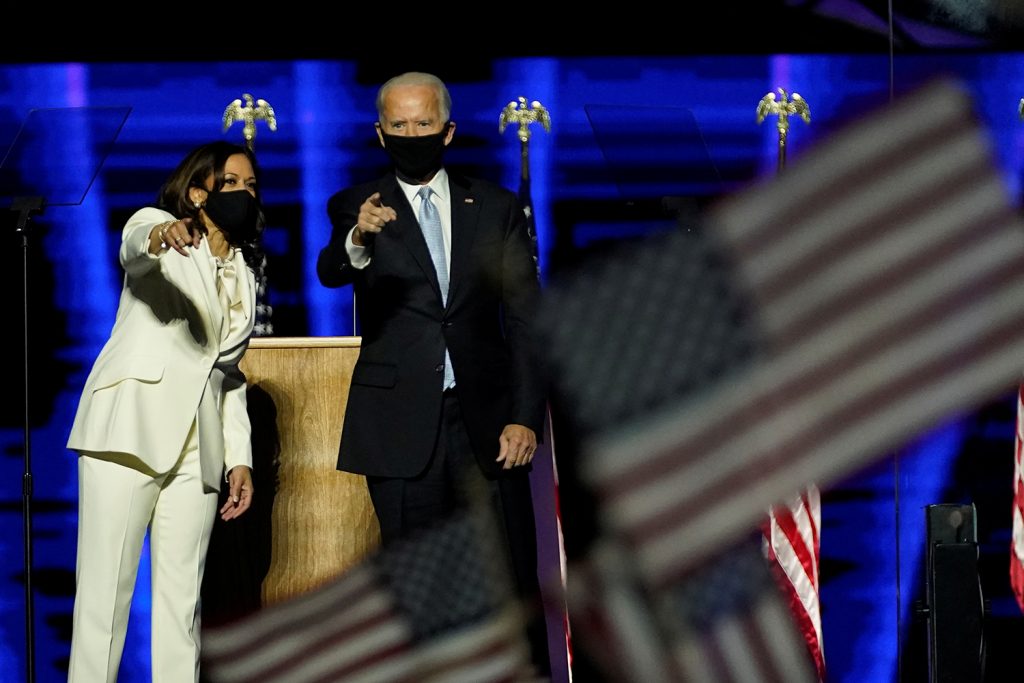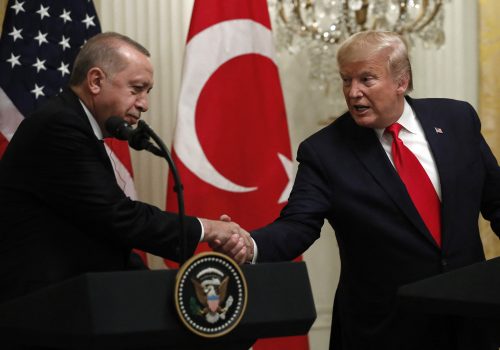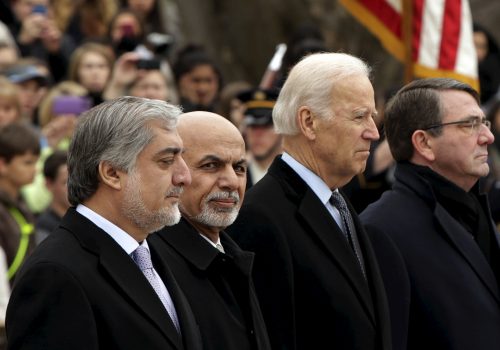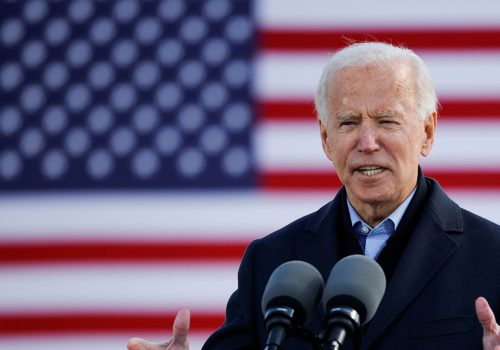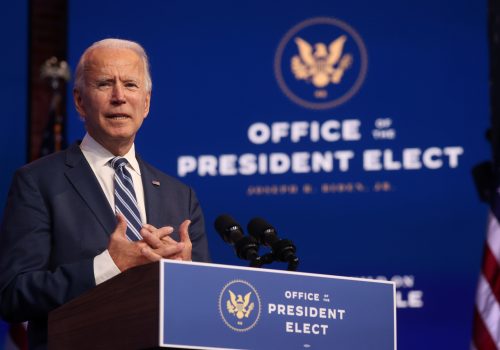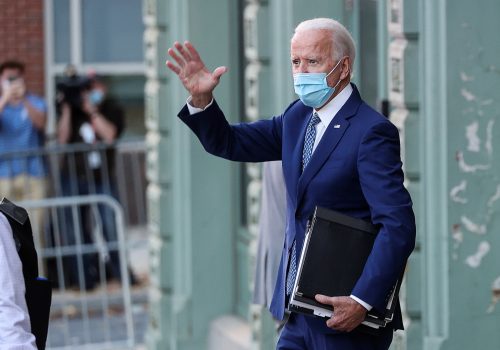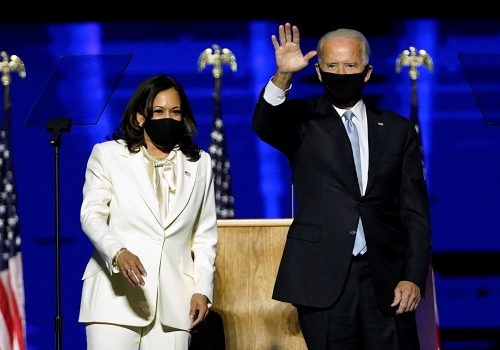In mere weeks, Joe Biden will stride into the Oval Office and peer out at a world still reeling from the COVID-19 pandemic and at growing threats from resurgent US adversaries such as China and Russia. Leaders around the world will have to adapt to a new US administration and its potentially dramatic changes in policy and rhetoric.
We asked Atlantic Council experts to preview what Biden’s election means not just for regional heavyweights, but also for smaller nations who could play an outsized role in US foreign policy over the next four years.
Jump to a region:
EUROPE
GERMANY: A brighter tone and realistic expectations could rehabilitate relationship
“After four years of what many in the country viewed as President Trump’s irrationally abrasive treatment of Germany as a key US ally, we can expect an instant improvement in the atmospherics between Washington and Berlin under a Biden administration. That matters in a bilateral relationship that is ever more important as an anchor for the broader, post-Brexit partnership between the United States and Europe. Many among Germany’s foreign policy establishment know Biden and his Europe team well. His own foreign policy credentials, institutionalist track record, and the promise of a return to a more multilateral approach in US policy will create much goodwill in Germany. And rejoining the Paris climate accords would give the Biden administration a quick public diplomacy win with Germans across the political spectrum.
“In der Sache” (on substance), however, decisionmakers in Berlin for months now have been downplaying expectations of any significant US policy shifts, let alone a return to an old ‘normal’ in transatlantic relations. Even if a Biden administration speaks more softly, it will continue to press Germany on greater burdensharing in European defense and remain hostile to Nord Stream 2. The new administration will continue its predecessor’s demands for Europe to join a united front against Beijing which will put German political and business elites in a bind. Meanwhile, the next administration will avoid further escalation on the trade policy front. But Biden’s campaign rhetoric about ‘building back better’ and the Democrats’ own divisions on the subject of trade make tangible progress on existing disputes, relaunched US-EU talks, or ambitious reform of the multilateral system under the World Trade Organization (WTO) unlikely—all issues high up on Berlin’s agenda.
“In her official statement on Biden’s election, Chancellor Angela Merkel acknowledged that Germans “have to take on more responsibility. America …expects more from us—and rightly so.” More realistic expectations in Berlin about the relationship and Germany’s own role, combined with a more constructive posture and tone from Washington, might be just what US-German relations need. There will be plenty of issues for US and German officials to test these new approaches to the partnership.”
Jörn Fleck, associate director in the Atlantic Council’s Future Europe Initiative
Subscribe to the Fast Thinking newsletter
Sign up to receive rapid insight in your inbox from Atlantic Council experts on global events as they unfold.
HUNGARY: Biden needs to invest in the relationship
“Though it won’t be easy, President-elect Joe Biden and his foreign policy team need to make an investment in Hungary. US-Hungarian relations deteriorated significantly over the last decade as the US government responded to a widely-perceived authoritarian drift by Prime Minister Viktor Orbán. President Donald Trump’s close personal ties with Orbán exacerbated the problem, putting US-Hungarian relations on a partisan footing in Washington. This partisanship became even clearer during the US presidential campaign: Minister of Foreign Affairs and Trade Péter Szijjártó connected Biden to the Obama administration’s actions, lamented Obama-era policies, and brought up “suspicious” activity in Ukraine for which Biden should provide answers; Orbán explicitly endorsed Trump.
“The Biden administration thus may be tempted to return to the Obama policy of disdain and isolation. It may be more productive, however, to try a dual-track approach, pursuing cooperation on an official agenda (including the Three Seas Initiative, supply chain and economic recovery issues, energy security, and defense cooperation), while also clearly addressing the problems it sees (e.g. Orbán’s pressure on institutions and the rule of law, freedom of the media) and reaching out to all Hungarians, including the opposition. In the process, the administration should separate issues of democracy or rule of law from partisan preference.
“At some point, it may be possible for Biden to go to Hungary. US presidents have only visited four times since the 1970s, and not since George W. Bush in 2006. That matters, especially as others make an effort to show up (Vladimir Putin has already visited four times since 2015). A visit is not an award; it can and should be used as an opportunity to discuss real work and challenges, and send a message of support to the Hungarian people. In any case, President-elect Biden should appoint an ambassador who can deftly balance between upholding our values and pursuing collaborative policies, and quickly since there is no longer a US ambassador in Budapest.
“The road ahead will not be easy or short. But as President-elect Biden and his team prepare to lead our nation, a concerted effort should be made to invest in this relationship. Hungary’s government needs to do the same. The NATO alliance, and US-EU relations more broadly, risk real damage if we don’t.”
Denise Forsthuber, associate director in the Future Europe Initiative
GREECE: Historic goodwill to be tested by deep regional challenges
“Joe Biden will take over the US presidency at a time when relations with Greece are being heralded as the best in a generation, a result of aligning interests between successive US administrations and Greek governments—from President Obama’s support during the Greek debt crisis to the Prespa agreement that opened the door for North Macedonia to join NATO.
“Strong bipartisan support in Congress for the strategic relationship with a stable, democratic ally that drives regional cooperation on energy and security has also helped. At a time of great power competition, US national security interests are bound to benefit from deeper bilateral defense, economic, and energy cooperation.
“However, relations will be tested should Turkey’s agenda in the Eastern Mediterranean lead to conflict between the two NATO allies. As tensions rise in the Eastern Mediterranean, the issues at hand—conflicting maritime claims, dwindling chances of Cyprus reunification, proxy wars, the threat of Islamist radicalism—call for decisive US engagement and a coordinated transatlantic response to restore the foundations for security and prosperity in a volatile region.”
Katerina Sokou, nonresident senior fellow in the Future Europe Initiative.
POLAND: Drop the politics, and get back to basic values
“Poles—both supporters of the rightist government and the liberal opposition—seem concerned that Poland will lose US support under a Biden administration. Not necessarily. In fact, the elements for deepened cooperation are there. On key issues—resisting Kremlin aggression, strengthening NATO, increasing US military presence in Poland, supporting Ukraine’s sovereignty and systemic transformation, backing democracy in Belarus, Central European energy security, and more, US and Polish views are already in sync and are likely to remain so under Biden. Indeed, the Biden administration is apt to be a steadier ally (privately, senior Polish officials were as concerned as other Europeans about Trump’s fawning approach to Russian President Vladimir Putin).
“The problem is politics. Team Trump saw the rightist Polish government as a friend on issues of nationalism and culture, hostility to the European Union, wariness of Germany, and edginess about media freedom (tendencies Team Trump sometimes exaggerated). The Polish government may have seen Trump as a counterweight to the European Union, which objects to some of the harder-edge Polish government moves on judicial politicization and pressure on the media. That partisan alignment in US-Polish relations will vanish under Biden.
“That’s for the best. Aligning with one wing of Polish politics, or vice versa, is a recipe for a mess after every election. Instead, US-Polish relations should rest on common democratic values and a strategic orientation that flows from these: basically, strong alliances of democracies, starting with the United States and Europe, with Poland embedded in that common community. That’s the approach Poles pushed on American policymakers soon after they overthrew communist rule in 1989. That’s the approach President-elect Biden outlined during the election campaign.
“The Polish government needs to think about its next moves, including at home. Team Biden may have some questions about some trends in Poland, but there’s a lot of good will toward Poland. Much depends on decisions to be made in Warsaw.”
Daniel Fried, Weiser Family distinguished fellow at the Atlantic Council and former US ambassador to Poland.
EAST ASIA
TAIWAN: US needs to boost its commitment to protect vulnerable Taiwan
“Taiwan should be one of the top priorities for the Biden administration, as it is becoming Beijing’s main target of expansion while the US-China strategic competition continues. Chinese President Xi Jinping has made unification a top priority and Beijing has recently said that it may consider non-peaceful means to achieve this goal through military invasion. The current US security commitment to Taiwan is less than clear, as there remain doubts about whether and to what extent Washington would intervene against a Chinese invasion. Such an operation would be logistically difficult as there are no US troops stationed in Taiwan like in Korea or Japan, and a US intervention could potentially escalate to a major—and possibly nuclear—war with China. The Biden administration should focus on strengthening its economic and diplomatic relations with Taiwan to build up its credibly as a guarantor of Taiwanese security and make Beijing think twice about a potential attack.”
Miyeon Oh, director of the Asia Security Initiative in the Atlantic Council’s Scowcroft Center for Strategy and Security.
NORTH KOREA: A step-by-step approach to denuclearization
“While Biden will find it difficult to prioritize the denuclearization of North Korea in the midst of the many domestic economic and social problems facing his administration, he could be forced to act if North Korea attempts provocations in the first couple of months. Such actions could prompt harsher sanctions, as Biden has previously suggested, and would probably scuttle the chance to hold a high-profile summit with Kim Jong-un. The Biden administration could also consider a step-by-step approach that connects targeted sanctions relief with denuclearization, if the Kim regime were to take some serious, verifiable steps to roll back its nuclear program. Vice President-elect Kamala Harris has previewed this approach arguing that “simply demanding complete denuclearization is a recipe for failure.”
Miyeon Oh, director of the Asia Security Initiative
THE PHILIPPINES: Closer eye on human rights, but potential for more partnership
“US-Philippine relations will likely change under a Biden administration, as President Trump’s indifference towards the Philippines’ domestic affairs allowed President Rodrigo Duterte to continue his controversial “war on drugs” that has led to the deaths of at least 8,000 people. The Biden administration will likely be highly critical of human right violations, should Duterte attempt to continue his policies. This may give the US Congress an incentive to pass the Philippine Human Rights Act, which would effectively end military aid to the Philippines. However, Biden’s emphasis on the value of alliances and commitment to restoring US leadership could incentivize the new administration to prioritize revitalizing the US-Philippine alliance, after two years of high-profile disagreements on the Mutual Defense Treaty and the Visiting Forces Agreement. One potential starting point for the Biden administration could be to resume talks for a bilateral trade agreement, in an attempt to put relations back on track.”
Miyeon Oh, director of the Asia Security Initiative
EURASIA:
GEORGIA: Biden will continue strong US support for Tbilisi
“Joining in the stream of world leaders congratulating President-elect Joe Biden and Vice President-elect Kamala Harris, Georgian leaders offered their warm congratulations and voiced their optimism for a continuation of the close US-Georgia strategic partnership under a new administration. Georgian Prime Minister Giorgi Gakharia aptly noted Biden is a longtime friend of Georgia. While Biden’s victory has been greeted enthusiastically in Tbilisi, Georgia was fortunately, and wisely, well positioned for either US election result due to their longstanding and broad bipartisan support in Washington. Although Biden is expected to be tougher on Russia, it is doubtful that there will be a dramatic difference of policy towards Georgia under a new administration.
“However, Biden will bring more encouraging rhetoric along with a more pronounced view of Georgia’s importance as a frontline for democracy and a crucial ally in the fight against Kremlin aggression. A Biden administration will continue strong US engagement with Tbilisi and support for Georgia. It will be worth watching to see if that support includes helping to create an advanced path to NATO membership for Georgia. While US support for Georgia and security assistance is not likely to change, it would be wise for Tbilisi to note a Biden administration will keep a closer eye on any democratic backsliding. Partnership is vital on security, but reform and democracy promotion must also continue. All in all, a President Biden will mean that Washington remains a close friend to Tbilisi.”
Shelby Magid, associate director in the Atlantic Council’s Eurasia Center.
BELARUS: Stronger statements and deeper allied coordination
“Joe Biden’s election will have a clear and positive impact throughout Europe and Eurasia, including in such hard cases as Belarus. Biden is a devoted transatlanticist who understands that a strong NATO and strong US-EU relations are essential for US security and prosperity. He will devote serious efforts to mending the ties that frayed under President Trump. That will strengthen our efforts to contain the Kremlin’s aggressive policies, confront China—our largest security challenge—and to manage the crisis that emerged in Belarus three months ago, following Alyaksandr Lukashenka’s efforts to steal the August 9 presidential election.
“Since the fall of the Soviet Union, Biden has been a strong advocate for the nations of the former Soviet Empire to exercise their sovereign rights and choose the path of democracy and an open society. What this means for Belarus is that the Biden administration will explicitly support the people of Belarus as they continue to demonstrate for free and fair elections. His skill in working with allies also means that the United States will be able to find a common language with the EU in imposing additional penalties on Lukashenka and his associates if they continue to crackdown on the demonstrators.”
Ambassador John Herbst, director of the Atlantic Council’s Eurasia Center and former US ambassador to Ukraine.
AFRICA
Focus on commercial relationships, conflict risks, and democratic transitions
“Looking at Africa, Biden’s team will see several sets of priority countries: those that are key to improving commercial ties, those that are conflict-prone and could set off further instability, and those undergoing political transitions and where the Biden administration’s attention could contribute to stability and democratic gains.
“Under Biden, the United States will continue to prioritize the expansion of commercial relationships with Africa, combatting China’s growing influence on the continent by leveraging emerging commercial tools, such as Prosper Africa’s forthcoming $500-750 million Africa Trade and Investment Program (ATIP) and the new US International Development Finance Corporation, which boasts an expanded investment cap of $60 billion. Economic hubs in Africa such as Nigeria, Kenya, Angola, South Africa, Ethiopia, and Senegal will likely remain priority markets for the Biden administration, though relationships will need to be repaired in order to maximize commercial cooperation. The Democratic Republic of the Congo will also be an important focus; though it is a lower-income country, it possesses a large, resource-rich economy and potential opportunities to re-shore mineral supply chains, shifting control of production away from East and Southeast Asia. Kenya, in negotiations to become the first sub-Saharan African country with a free trade agreement (FTA) with the United States, will also be a country to watch. Though the FTA is likely to move forward under the Biden administration, focus may shift back toward multilateral arrangements such as the African Continental Free Trade Area.
“On the security front, the post-COVID resource-constrained environment will reduce the little appetite that remains for military adventurism in Africa. While the US military will still play a role in securing key geostrategic regions, a Biden administration is likely to advocate for a “counterterrorism plus” strategy that emphasizes targeted US special operations, intelligence sharing with EU allies, and airstrikes in lieu of larger troop deployments. (Though even the tempo airstrikes is likely to be reduced.) Priority countries for the Biden Africa team include Mali, an important Sahelian country in flux after the military staged a coup in August, and perennially conflict-prone Somalia, where there is the potential for a long overdue rethink on how to combat al-Shabaab.
“In addition to conventional commercial and security partners, the Biden team will have opportunities to support meaningful transitions across the continent in countries that remain integral to regional success and stability. In West Africa, Mali’s recent coup and Côte d’Ivoire’s contentious presidential election have created concerns about leadership and stability in a region where terror activity risks expanding beyond the Sahel. Across the continent, Sudan’s terror designation was recently removed, creating the opportunity for enhanced diplomatic relations that will be essential to overcoming the country’s substantial economic and governance challenges. Even countries like Uganda and Ethiopia, which have historically been stable, are facing their own domestic political confrontations that risk escalation. It is from these countries that the Biden administration may cement its Africa legacy, hopefully strengthening democratic allies, while solidifying African peace and prosperity.”
Alyssa Harvie, program assistant in the Atlantic Council’s Africa Center; Jordan Wolken, intern in the Africa Center; Vicky Marie Addo-Ashong, intern in the Africa Center.
MIDDLE EAST
IRAN: No easy path toward a reset
“The Trump administration’s ‘maximum pressure’ campaign of economic sanctions has blacklisted the entire Iranian energy and financial sector, resulting in Tehran abandoning some of its nuclear commitments and leaving the United States largely isolated on the issue. President-elect Joe Biden’s vow to reenter the 2015 nuclear deal with Iran (provided Tehran also reenters compliance), as well as rescind the travel ban on Iran (and several other mostly Muslim majority countries), cannot take effect until after Inauguration Day.
“On November 7, Iranian President Hassan Rouhani underscored that a possible US return to the nuclear agreement needed to be accompanied by compensation for damages caused by Trump’s withdrawal and a “guarantee” it will not be repeated. Iran’s supreme leader, Ayatollah Ali Khamenei, ever defiant, followed up with claims that the United States is untrustworthy regardless of who is in the White House.
“In the short term, the Trump administration is likely to continue its maximum pressure campaign. Indeed, targeted sanctions focus on Iran’s ballistic missile program and human rights abuses in an apparent effort to complicate sanctions removal under Biden. For its part, the Iranian hierarchy remains ambiguous about whether it will embrace the Biden administration’s approach. With Iranian presidential elections in June, a segment of the hierarchy would rather see continued animosity short of war.
“However, with low oil prices, soaring inflation, and shortages of medicine amid a pandemic, it makes sense for Tehran to be happy about the new prospect to pursue sanctions relief through diplomatic channels even if it will make every effort to not look over-eager. In other words, the road to new US-Iran reengagement will be arduous, but the prospects for improvement are real.”
Masoud Mostajabi, associate director in the Atlantic Council’s Middle East Programs.
QATAR: Has Doha lost its leverage?
“Conventional wisdom says that Qatar will benefit from a Biden administration that distances itself from Saudi Arabia, the United Arab Emirates (UAE), and Egypt—countries promoting the three-year rift with Qatar. But this increase in distance will mean a reduction in leverage. The Trump administration put notable effort into pressing these countries to end the rift, using both threats and incentives. Yet they were unsuccessful. In order for a Biden administration to catalyze an end to the rift, they will have to be willing to compromise on other objectives with regard to these states. Do they prioritize the rift above human rights issues, the war in Yemen, the future of Libya or Syria, the Gulf’s ties to China, or limiting arms sales? Doha will need to shore up support within the new administration for the US airbase remaining in Qatar, and will need to convince the White House that resolving the rift is a fundamental underpinning to other US goals in the region. Only this buy-in from Washington will ensure that the US government is willing to make the compromises and take the risks that will be necessary to end the rift and the blockade.”
Kirsten Fontenrose, director of the Middle East Security Initiative in the Atlantic Council’s Scowcroft Center for Strategy and Security.
IRAQ: Baghdad needs practical support now
“President-elect Joe Biden has had a checkered history in Iraq. As chair of the Foreign Relations Committee, he voted in favor of the Iraq War and helped sell it to the American public, only to rapidly become a critic. As vice president in the Obama administration, he played a significant role on Iraq policy, including supporting a lopsided Nouri al-Maliki government, first drawing down US troops, and then resending them to fight against the Islamic State of Iraq and the Levant (ISIS).
“By years end, there will be approximately 3,000 US troops in Iraq helping local forces fight the remnants of ISIS. Echoing President Donald Trump’s own pledge to discontinue “endless wars,” Biden has vowed to bring home US combat troops from both Iraq and Afghanistan. With the majority of American’s in support of such withdrawal, it may be a unifying issue on the domestic front.
“However, as the president-elect likely knows well, Iraq stands at the precipice, facing a multitude of challenges including a contracting economy exacerbated by low oil prices, the COVID-19 pandemic, lack of basic servies, protests, security concerns, and endemic corruption. Thus, a Biden administration would do well to create a balanced economic and security policy, for Iraq’s sake, rather than treating the country as just an extension of its competition with Iran.
“Iraq is at a critical juncture and needs practical support to stabilize its failing economy. The current Iraqi Minister of Finance Ali Allawi recently released an extensive and detailed ‘White Paper’ (English) on full-scale economic reform. An effort to aid such endeavor and create an environment that promotes inclusive growth and employment may be the best remedy to curtail civil unrest, conflict, and external influence.
“Biden is unlikely to fully bring home all US troops, but rather leave residual counterterrorism forces and intelligence assets in an effort to continue training and providing logistical support for Iraqis conducting small-scale operations against perceived threats to the Iraqi state and US interests.”
Masoud Mostajabi, associate director in the Atlantic Council’s Middle East Programs.
LIBYA: A clearer definition of US strategy
“The Biden administration’s biggest change will be in form rather than in substance. The sporadic and inconclusive policy dictated by President Donald Trump will be substituted by a process-oriented and institutional approach. The United States will employ more and better resources in support of the UN-led negotiation process and likely appoint a special envoy to coordinate the efforts of the various agencies within the US government.
“Before getting to a precise definition of what an American-led effort in Libya will look like, the Biden administration must first define its policy toward Turkey and Russia. These two actors have emerged as the dominant powers in the west and east of Libya, respectively. If the president-elect decides that containing Russia and hopefully squeezing it out of Libya is a priority, then he will reach out to Turkey and find an agreement that will eliminate any Russian threat and, at the same time, contain Turkey within a stricter relationship. Counterterrorism operations will continue much in the same way as before with effective target operations. US international agencies will be encouraged to increase their operations in Libya to further develop and support a civil society still at its infancy. A very optimistic result—well within the possibilities of the new administration—would be a successful push towards unifying the policies and the actions of its European allies in Libya. Reaching this objective will go a long way in helping Libyans develop a strategy and a policy to solve the current crisis and the development of stalled political and economic systems.”
Karim Mezran, resident senior fellow at the Atlantic Council’s Rafik Hariri Center for the Middle East.
SYRIA: Serious US engagement returns
“Ten years into the Syrian conflict, Bashar al Assad has solidified his grasp over large swathes of Syria’s territory and the country’s largest cities, and reverted to his policy of terrorizing a desperate population into submission. It is difficult to imagine a scenario where Assad and his allies remove their claws from Syria easily in the short-to-medium term. That does not mean there is nothing for a Biden administration to do in Syria, however. The incoming administration has vowed to operate internationally with principled values in mind. Under a Biden administration, the United States will once again signal its preference for responsible, responsive democracies, and support “civil society and pro-democracy actors” in Syria. This should bring Syria watchers some solace, especially following four years of an incoherent and erratic Syria policy that lost sight of creating a democratic Syria over the longer term, and undertook actions like halting assistance to civil society that left civilians more vulnerable to terrorist groups.
“Targeted sanctions will remain a critical tool in effort to maintain pressure on war criminals, corrupt regime officials, and exploitative companies and organizations. Accountability measures and evidence documentation, ongoing in European courts to hold perpetrators to account, will likely receive continued support. Humanitarian aid to millions of vulnerable civilians, the 4 million in Idlib and 3.1 million in northeast Syria, will provide a critical lifeline. The United States will reaffirm its membership in multilateral institutions like the UN; in the same vein, there is hope for increased accountability on how such institutions operate in corrupt contexts like Syria. Finally, banned from resettlement in the United States the past four years, America will once again responsibly welcome Syrian refugees.
“While the 750 American troops deployed in Syria have played a vital role—at a limited cost—in keeping the Assad regime and allies from attacking our coalition partners and maintaining gains against ISIS, a Biden administration would likely consider ways to further stabilize the area to permit future US withdrawal. Negotiations would require US diplomatic muscle to address SDF-Turkey tensions, intra-Kurdish tensions, and Arab-Kurdish conflict. Meanwhile, the return of serious US diplomatic engagement can deter Russia and Iran from acting against US interests without repercussions. Finally, a Biden administration would no longer promote the notion of ‘America alone’: working with allies in Europe and in the region, the United States will more effectively respond to brutal attacks and mass displacements by the Assad regime and its allies in Idlib and elsewhere that we’ve seen climb exponentially during the Trump administration.”
Jomana Qaddour, nonresident senior fellow with the Rafik Hariri Center and Middle East Programs.
Further reading:
Image: Democratic vice-presidential nominee Kamala Harris and Democratic 2020 U.S. presidential nominee Joe Biden greet supporters at an election rally, after news media announced that Biden has won the 2020 U.S. presidential election, in Wilmington, Delaware, U.S., November 7, 2020. Andrew Harnik/Pool via REUTERS
